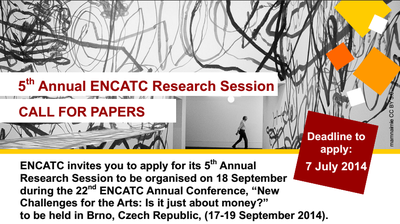posted on
European Network of Cultural Administration Training Centres

European Network of Cultural Administration Training Centres (ENCATC) is the leading European network on Cultural Management and Cultural Policy education. Established in Warsaw in 1992, ENCATC is the only European network gathering together higher educational institutions and training organisations dealing with cultural management education and training.
ENCATC represents, advocates, and promotes cultural management and cultural policy education, professionalises the cultural sector to make it sustainable, and creates a platform for discussion and exchange at European and international level.
ENCATC represents all disciplines in the arts and culture, is an NGO holding the status of official partner of UNESCO and of observer to the Steering Committee for Culture of the Council of Europe. It’s a lively and expanding European platform encouraging serious exchange of knowledge, methodologies, experiences, comparative research and regular assessment of the sector’s training needs in the broad field of cultural management from a European point of view through a wide range of working groups, projects, activities and events.
ENCATC voices the views of their members through dialogue with international and European institutions and organisations on legislation, policies and programmes impacting on education and training in cultural management and cultural policy. ENCATC cooperates closely with partners at UNESCO, the Council of Europe, the European Commission and the European Parliament as well as with the European Cultural Foundation.
ENCATC fosters – in different forms and at different levels – close co-operation with networks worldwide concerned with the teaching of cultural policy and cultural management, in particular in Africa, the Asia–Pacific region, North America, Latin America and the Caribbean. ENCATC plays a crucial role in ensuring the sustainability and in strengthening the competitiveness of the culture and creative sectors since its members are directly responsible for the education of future managers and operators and of the future European citizens who will profit from cultural offers at European, national and local level.
Similar content
posted on
posted on
posted on
posted on
posted on
posted on




